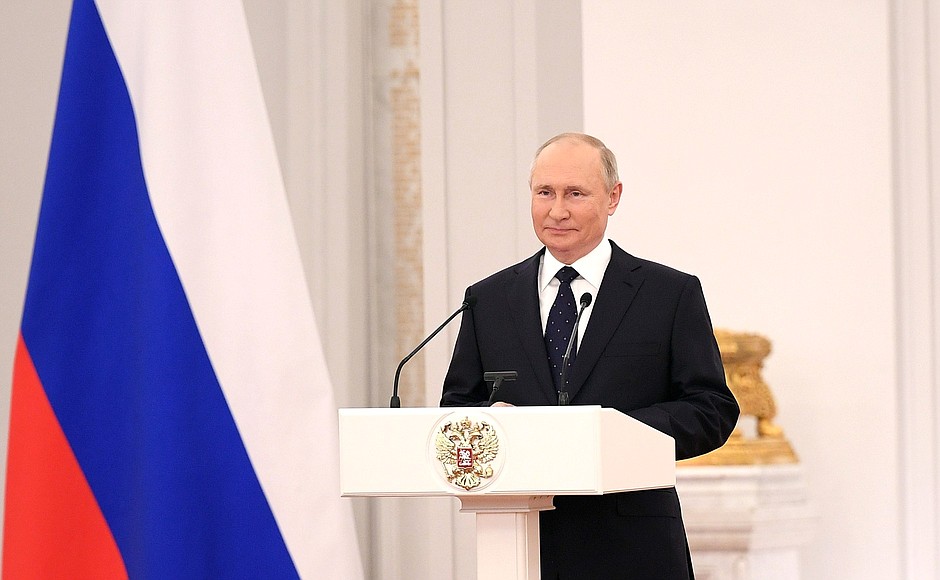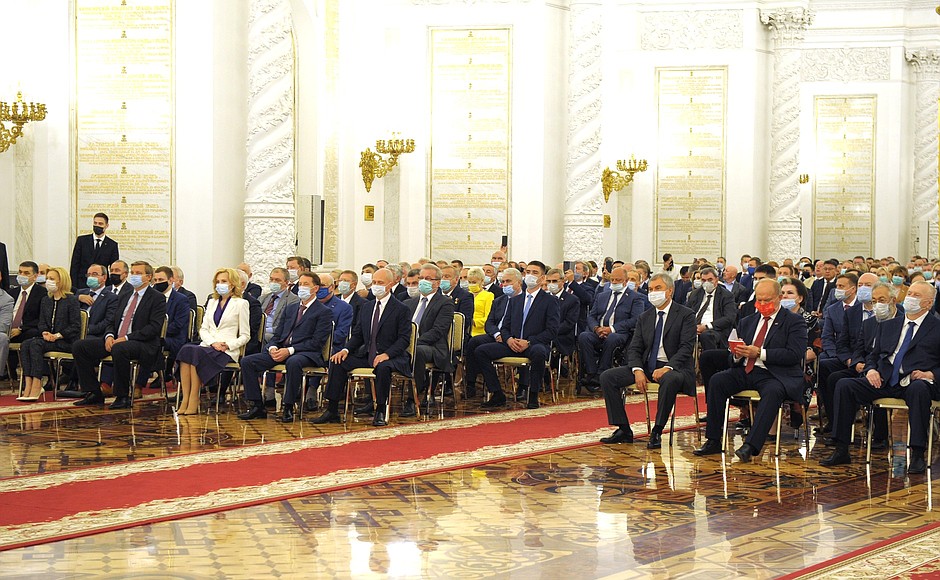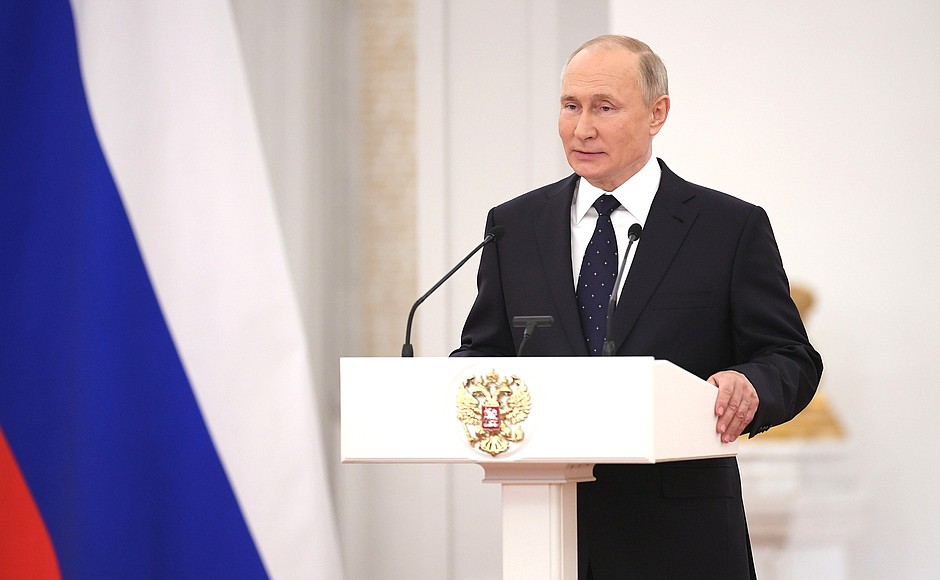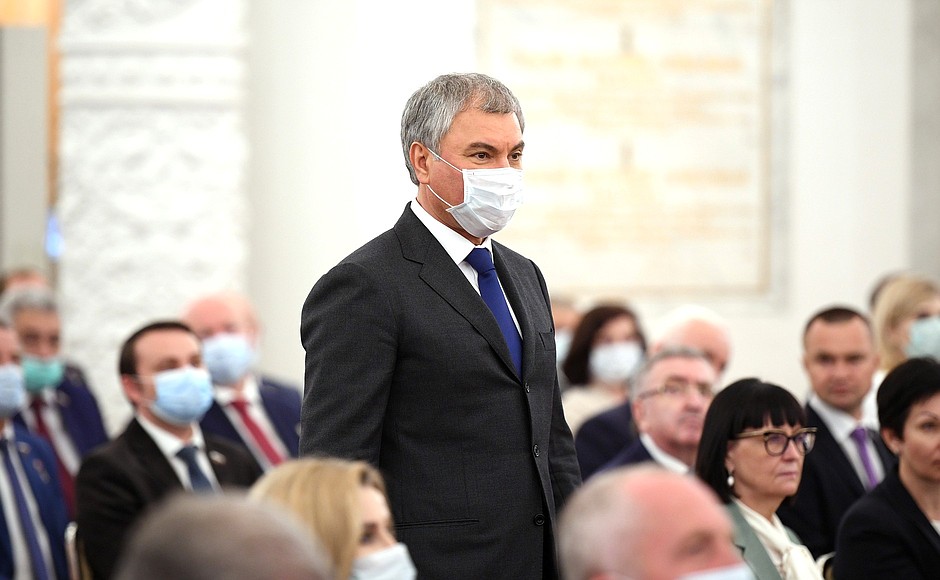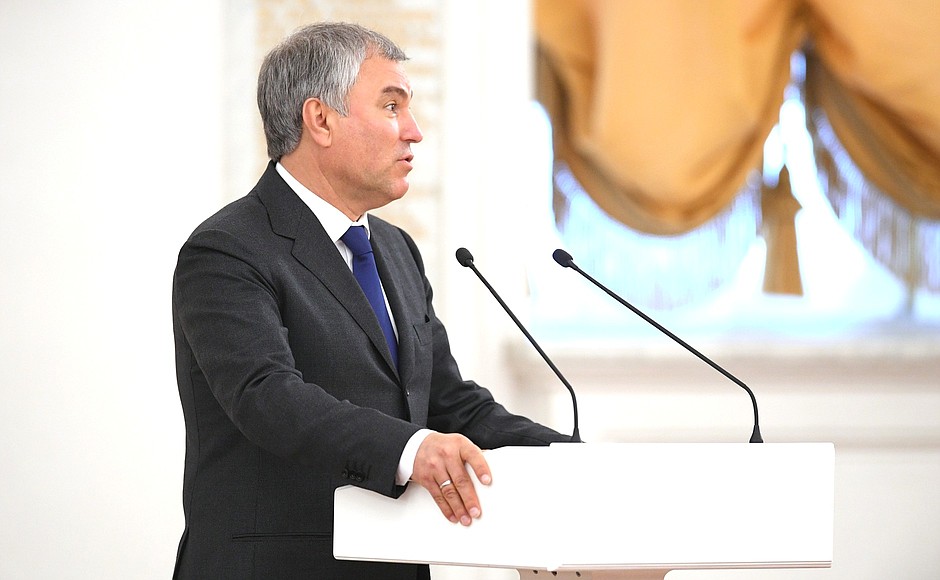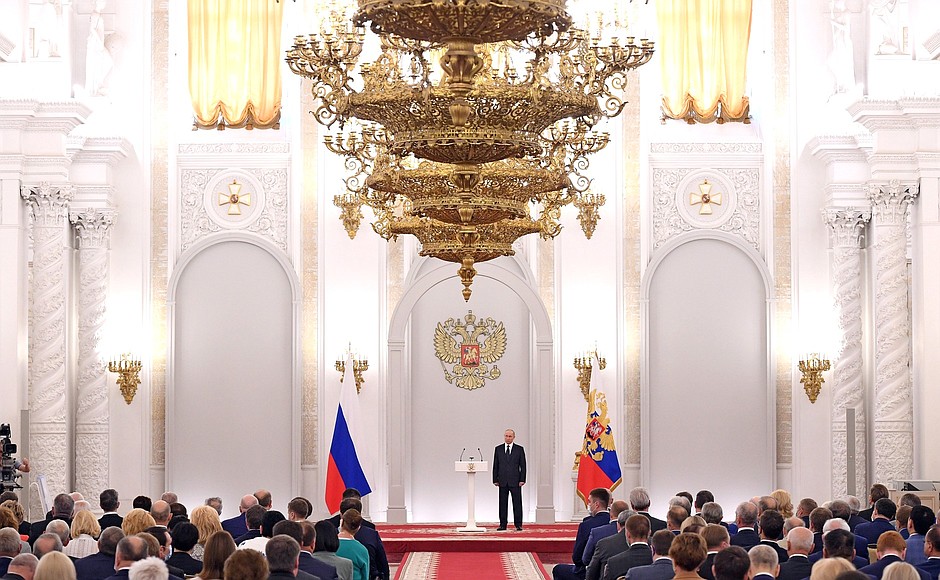President of Russia Vladimir Putin: Colleagues, friends,
The moment has come when the seventh State Duma is completing its work, and by tradition I thought it important to meet with you and sum up some results.
First of all, I would like to thank you – all the factions of the Russian parliament – for your professionalism and sense of responsibility. You have worked at this high level practically throughout the entire five years of your legislative term.
The Duma leaders as well as all the parliamentary committees and commissions have acted in a coordinated and effective way; they have established constructive rapport with the Government, the Presidential Executive Office, colleagues at the Federation Council, and the regions. They always aimed at achieving a common result, and at seeking optimal solutions to each issue submitted for the parliament’s consideration.
I am aware that much has been done to enhance the quality of legislation and to increase the number of directly applicable laws that do not require any bylaws. The practice of public discussions has been expanded via new formats. For example, “grand” parliamentary hearings, as you call them, dedicated to the most resonant and complicated matters and problems came to be held.
Let me note again that all the factions – United Russia, CPRF, LDPR and A Just Russia – and all the deputies elected both on the party lists and in constituencies have made an important and significant contribution of their own to the common achievement.
Of course, far from every approved law was unanimously supported. This is only natural, disputes are inevitable, and this is fine. However, criticisms were, as a rule, substantive and to the point. I know this, among other things, by our meetings with the leaders of the State Duma factions. And, colleagues, I would like to tell you that I value highly our direct dialogue of this kind.
It is the diversity of opinions, approaches and initiatives, as well as respect for alternative points of view that strengthen the parliament’s status and role as the supreme body of legislative and representative power, whose main tasks are always, under any circumstances to think and take care of people and to protect Russia’s national interests.
Let me also note that, in fact, three sessions out of ten you had to work under extraordinary conditions – in an environment created by a dangerous epidemic. But the legislative process was never interrupted even during what was the most difficult period for the entire country. It was not like this in all countries, in many of which parliaments ceased their work.
I think everyone is aware how important it was to work without a break: entire industries could grind and would have ground to a halt unless laws were approved on time; crucial; projects and programmes needed to develop the regions and enhance the quality of life of millions of people.
Your support and your most active, direct involvement helped to draft and implement several packages of urgent measures aimed at overcoming the consequences of the pandemic. For this, it was necessary to promptly approve dozens of laws. To reiterate: unless this had been done, then, to be quite frank and clear for everyone to understand, the funds would have simply been frozen up and failed to reach on time people, economic sectors and businesses. I will speak about this at some length later.
Regrettably, the threat of the coronavirus has not gone away, and the situation has even deteriorated in some regions, as you are well aware. Last spring and summer, when the situation was especially complicated, unpredictable and unclear, when many of us did not know what to do and how, we nevertheless repelled the first and most harsh effects of the epidemic by working together, winning time for mobilising the healthcare system and allowing our scientists to create a vaccine after all. Most importantly, we managed to quickly and effectively help people, those who were affected particularly badly, namely, families with children, those who had lost their jobs, small and medium-sized businesses, self-employed people, and workers at industrial enterprises, primarily strategically important ones.
I would like to add that some of the emergency crisis management packages we adopted have an open-ended timeframe, such as the halving of insurance contributions from 30 to 15 percent for small and medium-sized businesses. I recall that we worked together with you in real time, and how I asked the heads of factions and the parliament leadership to adopt these decisions without violating the law but as soon as possible. And you did it.
I would like to give special mention to your hard and painstaking work on the constitutional amendments. Members of parliament were among the co-chairs of the working group that prepared the amendments to the Constitution, actively participating in its meetings, helping people to become the co-authors of the Constitution, collecting and streamlining hundreds of ideas and proposals that came in from all over the country, and trying to find legally faultless wording for the new provisions of our Fundamental Law.
On July 1, 2020, they were adopted during a nationwide voting, receiving nearly 78 percent of the vote. This high and unequivocal assessment by the people shows that these amendments to the Constitution met the people’s expectations and were fully in line with a general striving to strengthen civil society and the Russian state, as well as their basic institutions, including parliament, to protect the historical memory of the people and our right to a sovereign path of development, to reflect the absolute social priorities of our political and economic course in additional specific and clear guarantees, and to introduce a large number of other fundamental amendments to the Constitution based on the experience of state development that we have accumulated since 1993, or over a period of more than 25 years.
I would like to add that the laws adopted by the State Duma to promote the implementation of the new articles and norms of the Constitution have already come into effect, which was a huge, challenging, delicate and careful job, as a result of which amendments have been made to 180 effective laws.
I appreciate your support for the initiatives set out in this year’s Address to the Federal Assembly. Much has already been implemented in the past two months. Specifically, a law has been adopted on monthly allowances for children aged between 8 and 16 in single-parent families on a low income, as well as for women in difficult circumstances who register with healthcare facilities at an early stage of pregnancy. Both measures will come into effect in 10 days, on July 1, 2021. The parliament’s work is coming to an end, but the decisions you have adopted continue working.
I am aware that you paid increased attention to issues of social nature and demography during the entire period of convocation and adopted over 100 laws just in the sphere of supporting and protecting motherhood, childhood and Russian families.
Likewise consistently and substantively, you dealt with the tasks of Russia and all its regions’ economic and infrastructural development; you created and improved new tools for attracting investment, such as an agreement on protecting and promoting investment and a special investment contract; you worked to eliminate excessive control and micromanagement with regard to business that hinder economic growth, and you repealed obsolete regulatory requirements via the “regulatory guillotine” mechanism.
People’s safety and state defence capability, as well as countering corruption and crime, are high on the Duma’s agenda, including when considering budget appropriations.
Here is what I would like to highlight. The leaders of all parties represented in the Duma and the deputies representing the different political forces always speak from a common and consolidated position when it comes to matters of external security and foreign policy, as well as protecting our country and our citizens’ interests. I am confident that Russian voters will support the parties and the candidates during the September elections, for whom serving the Motherland, the Fatherland, represents the highest value.
Colleagues,
There are less than three months before the elections, and our common responsibility is to conduct the election campaign so that no one doubts the legitimacy of the results. For all of us, for society and for the confident development of the country, it is important that the elected deputies of the eighth State Duma objectively reflect the will of the people and the sovereign choice of the Russian citizens.
To reiterate, our common goal, including for the parliamentary parties, is to have clean and honest, transparent and open elections in strict accordance with the law.
(Applause.)
The goal is to make sure that natural heavy competition takes the form of a civilised and substantive discussion without mutual accusations, disparaging remarks or empty promises that can never be fulfilled. I really hope that this phase in the life of the country is history and was left behind in the 1990s. Only a meaningful style of election competition and respect for opponents and, most importantly, for the citizens of the country, will serve to promote progressive and high-quality development of parliamentarism and a multi-party system in Russia.
And, in general, it will strengthen people's faith in all institutions of power – and this is a necessary and most solid foundation for moving forward and achieving national development goals. You are aware of how much still needs to be done and how important rotation is, but also, continuity in the parliament’s work, and a combination of experience and fresh, bold ideas are important. I hope that both mature and established parliamentary parties and new political forces that may run for State Duma seats will form their lists of candidates based on this balance.
Concluding my speech, I would like to once again sincerely thank you for your work and your contribution to the development of Russia, to wish your colleagues every success in the upcoming elections – you deserve it – and meaningful achievements to those of you who plan to embark on this new career. I am confident that your potential and your parliamentary experience will be a valuable asset.
Thank you very much for your attention.
<…>
Vladimir Putin: Both Mr Volodin and I, we mentioned the constitutional amendments in our speeches. I would like to say a few more words in this connection. I believe, I am confident, that qualitative changes will, must, take place in the interaction between parliament and the Government.
Indeed, this is not some kind of a cover, but a meaningful thing that suggests that the parliament will take a greater and more direct part in forming the Government. This means that interdependence between the representative, legislative, body of power and the supreme executive body of power in Russia – the Government – will be much firmer. I believe this should improve the quality of decisions made which is extremely important. Ultimately, it will contribute to the achievement of the national development goals that we are now discussing. This is the first part of what I would like to say in closing.
Second, I want to return again to the epidemic. Mr Volodin and I worked online, as I did sometimes with ministers and Government leaders, because decisions needed to be made imminently, and it was very difficult to make them without violating any regulations or existing legal norms – or we had to walk a tightrope. But we agreed that the parliament would have to act in these extraordinary conditions, in fact, as an executive body, but within its scope of competence.
This is what happened. You literally managed to get together at very short notice, draft and adopt a decision, as well as complete all the necessary paperwork. These are all extremely important things for people. Of course, an ordinary citizen may not have noticed it, may have taken it as yet another decision. But I know that this required an effort, especially during a pandemic, when it was necessary to get together on time and to get all services – technical, etc. – going. All of that was done at the top professional, quality level. Therefore, the work of the parliament of the seventh convocation was, in this sense, unusual in terms of the importance of the decisions it made during its term of work and in terms of quality.
Thank you very much, and I wish you every success.
I hope we will manage to accomplish much more together.
All the best!
